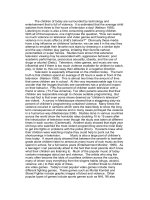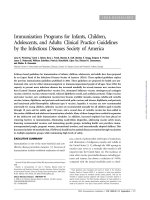children tv and violence
Bạn đang xem bản rút gọn của tài liệu. Xem và tải ngay bản đầy đủ của tài liệu tại đây (40.6 KB, 5 trang )
Children, TV, and Violence America has the largest crime rate in
the world. Along with that crime rate is also the substantially high
violence rate. Why? Why is violence becoming and everyday common
happening in our society? When you flip on the "tele" and tune into the
news, the highlight of every show is somehow directly related or
connected to violence. We see it every evening and perhaps say "Oh my
gosh, how terrible." and then forget all about it two minutes later. Or
perhaps we don't even make any comments at all, just a simple grunt or
" huh ". This numbness to violence is very scary and very real. Why is it
then that America has the most crime and violence. Why not Switzerland
or Australia. Are we not as civilized and advanced as they? I believe it is
this numbness to violence that has made America so violent.When I think
back to my childhood and remember television I remember watching such
programs as "Sesame Street", "Mr. Rogers", and "Scooby - Doo". I have
nothing but pleasant memories filled with happiness, peace,
understanding, and learning. When you watch children's programs today
you see senseless violence often as the first means of solving a problem.
The classic view of "good" versus "evil" is the basis of these shows with
violence as the answer. When children watch these programs they copy
the actions and "morals" of these shows depicting "good" and "evil".
Children do not know what "good" is or what "evil" is, how can they? This
world is not broken into "good" and "evil". "Evil" to children is what
opposes them, what does not agree with them, or any other person or
thing that poses a possible difficulty. Children must be taught that there
are differences in this world. This world is filled with many people holding
different beliefs, ideas, and morals. That is what makes this world so
unique and colorful. Children need to learn to respect these differences
from a very young age. They need to learn to talk out and solve any
disagreements or problems through other means than violence. They
must not "know" violence as an answer, as if violence was never even an
option to consider in solving a problem. I recently became aware of the
problem of violence in children when I started observing small children at
play at my apartment complex. I had known one small child in particular
when he was just learning to speak. I had watched him and talked with
him for several years and noticed nothing "violent" nor aggressive about
him. Back then he played more outdoors rarely ever going inside (except
when his mother called for dinner), but as he got older and more
interested in television I noticed that he was becoming much more
aggressive especially as he played outside with his friends and sisters.
He would punch and copy the moves of the cartoon shows he watched
even to the point of copying their war cries and sayings. The media
claims that they have no influence on children, that could not be further
from the truth. Children are the easiest to manipulate and take
advantage of because they are innocent and because they are innocent
they are also ignorant. Some people say that the boy was merely
maturing, becoming more like a man. But how many five year old boys
do you know that have testosterone flowing through their body? The
main problem was the television shows that he was watching. That is
very obvious. The problem with the above mentioned case was not just
television itself but the combination of television and child. Children are
very susceptible and easily persuaded as we all know. In the early 1960's,
Albert Bandura of Stanford was the first to present the theory that
children not only learned from their parents through imitation but also
through imitating television. So when children imitate what they see on
television, especially when it is something that is rewarded, and knowing
how violent television is these days, television can and does influence
children in violent and aggressive means. When children are raised with
violent television " they become desensitized to real people's
suffering " (Leland 47). When children watch a man get blown up
across the screen and see the hero prevail from the conflict it encourages
the thought that when you want something, it's alright to obtain it through
violence because you will be rewarded in the end. This along with the
fact that a murder on television shows is so common that children begin
to project what they see on television onto the world they live in and
resulting in confusing fantasy with reality. Most psychologists
believe that media alone is not the sole problem of violence in children,
but one in particular, Dr. Leonard Eron disagrees. He has done a 22
year study of children as they mature from the age of eight to adulthood
to prove his theory that television has a greater affect on children than
most think. His results are shocking. The studies conclude that the single
best predictor of adulthood violence and aggression is not due to violent
homes, poverty, poor school performance, single parent homes, nor to
real life violence, rather to heavy amounts of television/media violence.
But " of course not every youngster is affected." (Qtd. Leland 47). The
reason for this is because children with fewer natural aggressive
tendencies are less affected by television violence, in other words, if a
child is naturally aggressive, violent television tends to bring these traits
out. Eron also discovered that the content of the television doesn't need
to be violent to have a violent affect on children. In fact television shows
with high amounts of action and tension had the same results as those
with violence, adding to the large spectrum of television programs that
can have effects on children. Researchers have also found that the
affects of violence in television on adults is much lower to that of children
because adults know the difference between what is real and what is "tv
land". Eron also states that though television does not affect adults as
much, they are nevertheless affected, though in other ways. Another
view presented by Walter Wink, a professor of biblical interpretation at
Auburn Theological Seminary in New York City, states that:
Children identify with the good guys so that they can think of
themselves as good. This enables them to project out onto the
bad guy their own repressed anger, violence, rebelliousness,
or lust Salvation is guaranteed through identification with
the hero. (Qtd. Levine 24)Another interesting tid-bit about
television violence: by age 18, a child will have seen at least 150,000
acts of violence on the television. By age six, most children will have
watched 5,000 hours of television and by the end of high school, over
19,000 hours. That is a lot of television. What would happen without
television? One epidemiologist named Brandon S. Centerwall claims that
without television the United States would have nearly 10,000 fewer
murders per year, almost 70,000 fewer rapes, and 700,000 fewer
assaults. Although many disagree Centerwall's statements and
predictions, there is not doubt that without television there would be
fewer aggressive actions in the United States. Proving the "no television,
fewer crimes" theory will be very difficult but the evidence will eventually
surface in the years to come. Perhaps then the television companies and
corporations will begin to see, but perhaps it will be too late and television
will be planted to deep into the roots of American society. Children
need to be more creative and television certainly does not give children
the opportunity to be creative, Henry Alptrum puts it best with "The
absence of television spawns creativity." (Alptrum). Television gives the
viewer both sight and sound at once leaving only three senses to
imagine. Radio leaves four senses. Books leave all five senses to
imagine. In fact a study in Canada conducted by Tannis MacBeth 20
years ago on the effects of television on a small town produced results
that were not surprising at all. She discovered that with the introduction
of television to this small town creativity dropped and within two years the
number of incidents of pushing, shoving, hitting, biting, and all other
forms of aggressive actions by children increased as much as 160
percent. This cannot simply be coincidence. In another related study
directed by Centerwall murder rates and in the United States, South
Africa, and Canada doubled ten to 15 years after the introduction of
television. There are hundreds of documented tests and experiments
relating to the fact that violence on television has a very negative effect
on children. Is the media to take all the blame? Of course not. After all,
this is America and I believe nothing more strongly than freedom of
speech and expression. The solution to this problem is censorship.
Censorship not at the governmental level, nor at the state level, nor at the
cable company level, rather at the level of the parents. They and they
alone are the ones who need to decide what is best for their children for
only they know what is best. When I was a child my mother was always
there to tell me what I could and could not watch. Of course when I was
smaller I hated it, but now that I am older I am so grateful and thankful
that my mother censored what was fed into my brain. But another
problem arises! In today's society, two working parents is the norm. For
many children there is no one at home to tend them, to tell them what to
do and enforce it. Children are left to their own. A baby sitter as an
"adult" replacement is fine for watching over the safety of the children,
otherwise they could care less what the children watched because they
undoubtedly watched or still watch the same program or consider it
harmless because it is an "after school kids cartoon". What has the
media done to counteract this? Very little to nothing. They deny that the
problem actually exists. But the problem does exist and is very real, and
they can help stop it. They can help change it. What then is preventing
it? What is preventing the media from trying to help? Money of course.
What could be more important than money? These children's shows are
big money makers and that says it all. The media has done very little in
the actual solving of the problem, in fact about the only thing they have
done is to add a special 30 second warning before a show or television
movie that may contain scenes that require "parental supervision".
Although this is a step in the right direction, more action is needed.So
where does the solution lay? There are several options some are
obvious and some are just mere ideas. One way to control the television
is to not turn it on. Another idea is to not purchase a television, but that
is ridiculous because television can be informative and educational. Just
when it seems that all hope is lost technology finds an answer: The
V-Chip. The V-Chip was invented by a Canadian several years ago
with the purpose of censoring what can be seen on television by
youngsters. This chip could be inserted into all new television sets and
would enable the owner to define what type of television shows could be
viewed at home. This gives the parents total control over what is viewed
on the set when no one is home to keep an eye on the nest. The chip is
complete with a password to stop the little computer genius from
overriding any settings. Ratings include such topics as, violence (in
several levels), sex, language, mature content, etc It offers quite an
expansive array of options and certainly has it's benefits. But with every
new idea there is opposition. There are some that claim that it will never
help in the battle against violence, but these are the same people who
believe that more real type violence should be shown on television
because of the supposed fact that it would have a cathartic affect on the
populace. Others are weary about who decides what television show is
violent or what movie is too risqu‚. They fear the government will take
control over what the people will see and for that reason the V-Chip is
unconstitutional. But the V-Chip should be offered nevertheless to those
who want to take advantage of what it has to offer not unlike television
sets that are mandated to have equipment for the hearing impaired.
Dr. Eron, a well known and well accredited psychologist, adds
another possible problem to the V-Chip. He believes that the V-Chip is
too easy. The V-Chip actually takes away the responsibilities of being a
parent. The temptation for parents to merely block something out with a
chip and hiding the truth is much too great with the V-Chip. When
parents simply use the chip to block out the unwanted information
children's curiosity is heightened. The parent's responsibility should
include talking and discussing the problems of television violence. They
should discuss the feelings of victims of real violence and draw a distinct
line between what is seen on television and what is reality. Family rules
and regulations should be made on how much, when, and what
television programs can be viewed. The V-Chip helps in setting these
guidelines but is in no way designed as a stand-alone apparatus. One
thing is for certain and that is tv does have an affect of children today. It
has been proven over and over again in the many hours of research and
years of testing that in the long run tv affects people. None are more
affected than children. This problem of the affects of television is just
recently becoming a known and well established health issue. A handful
of scientists and psychologists had predicted that this nation would turn
into " a nation of morons." (Qtd. Davies 36). America went from a nation
with the highest standards of education and excellence in education to a
nation with some of the lowest scores in education in the third world. This
prediction of a " a nation of morons." (Qtd. Davies 36) is sadly becoming
true. When headlines like 'Six-year-old charged with battering baby' are
written across the front page of the daily newspaper that is when we
should realize that there is something wrong going on in this nation.
Children learn from watching television. Whether it is something morally
sound or something criminally sound children take in everything they see
and learn it. Parents must be the first line of attack against television
taking over the children because they can no longer ignore the problem
and hope that the television stations will somehow come up with a
solution. The stations have done very little to help. The V-Chip offers
some help but must be reinforced with parental discussions. There is
always one other alternative to censoring what is fed into the minds of our
children. Peter Goddard states it well with "You can turn the damn thing
off, you know." (25)









